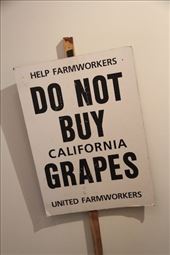I FIRST HEARD OF CESAR CHAVEZ FROM JONES. He is one of my oldest friends and self-appointed social conscience. We were all too preoccupied with finishing high school to care much about the Delano Grape Strike in 1965 where Chavez rose to national attention. But Jones was adamant that we should support the United Farm Workers by boycotting iceberg lettuce — the Salad Bowl Strike — which was easier to do in the 70s when salad was a nearly unknown food group in my family. So it was almost an obligation for us to visit Cesar Chavez National Monument.


Picket sign Grave Site
Under the leadership of Chávez and UFW co-founder Dolores Huerta, the farm worker movement joined forces with other reform movements to achieve unprecedented successes that greatly improved working and living conditions and wages for farm workers. During the 1970s the United Farm Workers of America expanded from a union for farm workers to become a national voice for the poor and disenfranchised. The enduring legacies of César E. Chávez and the farm worker movement include passage of California's Agricultural Labor Relations Act of 1975, the first law in the U.S. that recognized farm workers' collective bargaining rights.